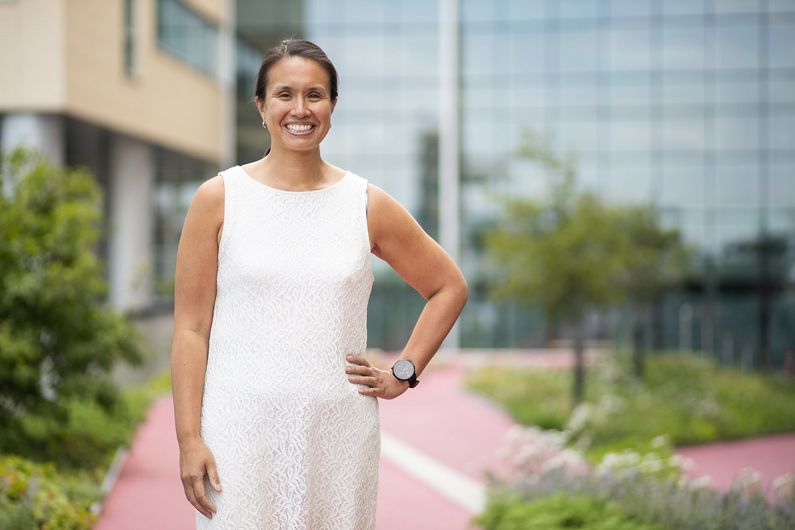A time of challenge and opportunity for science communicators
- UdeMNouvelles
04/28/2023
- Béatrice St-Cyr-Leroux
The 9th installment of the Conférences de la Montagne lecture series, presented as part of the Acfas convention, will feature Caroline Quach-Thanh, risen to prominence in a time of crisis.
The COVID-19 pandemic placed scientific research and discourse under unprecedented public scrutiny. Scientists were in the spotlight, tasked with explaining sometimes complex and nuanced concepts under intense political and media pressure.
How can and should scientists, the media and politicians interact during a crisis? What public stance should scientists take? Should they push a single official message or should many voices be heard, presenting all sides of the issue with all the grey areas?
These questions will be discussed by Université de Montréal professors Caroline Quach-Thanh and Ryoa Chung, and Amélie Quesnel-Vallée of McGill University, in a panel on reconciling science, media and politics in times of crisis, moderated by media personality Marie-France Bazzo. The event will take place on May 9 at the 90th Acfas convention as part of the Conférences de la Montagne lecture series.
Dr. Quach-Thanh is an internationally renowned microbiologist-infectiologist affiliated with Sainte-Justine hospital and is the Canada Research Chair in Infection Prevention and Control. She was one of the media’s go-to experts during the pandemic. We wanted to find out how she navigates the messy boundaries between science, media and politics.
During the COVID-19 pandemic, you became a leading science communicator in a time of crisis. Did you ever expect to be in this role?
Not at all. I was in the right place at the right time in my career. If it had happened 10 years ago, I would never have been able to live up to the expectations. But I was nearing the 20-year mark in my career, I had other experiences under my belt and had dealt with mini-crises in a less prominent capacity, so it was a combination of circumstances.
What do you see as the challenges of communicating science to the general public?
That is precisely what the discussion will be about: how much should we qualify what we say? Science is chock-full of qualifications, but that can make it harder to get the message across, since it has to be interpreted. So we’ll be discussing whether it’s better to have a single strong message in a crisis, or whether we’re better served by messages with more nuance and sometimes more than one message from different messengers, who may contradict each other.
So what’s your opinion?
Personally, I think that at the end of the day we are better off letting people express their views. I have faith in the intelligence of the public to sort things out and make sense of what is being said. People also need to realize that the message is not political, that the scientists are there to help them make good decisions and to explain the rules that need to be followed, if there are any.
Would you say scientists did a good job during the pandemic?
I think scientists acquitted themselves quite well. In general, they did a good job, but it’s hard to make a blanket statement. I believe those of my colleagues who went to the media did it for the right reasons and were able to explain the things that needed to be explained.
In this age of opinion and disinformation, do scientists get discouraged?
Things could be worse. Of course, we've all felt a bit discouraged at times over the last three years. At the same time, as scientists or educators, we have the opportunity to ask questions and find answers. We have a freedom of action that you don’t have in other professions or other environments. I think we’re very fortunate to have a measure of control over our lives.
And if you had to do it all over again—let's say there’s a new pandemic—would you be ready to take up the mantle of science communication again?
I hope there will be 10 years between the two [laughs], just so we can all catch our breath. But, yes, I think if I'm still fit and capable of communicating effectively, I’d take up the mantle again. But if there are younger people who are ready to take over, I’d be happy to let them. It isn’t about being in the public eye no matter what, it’s about stepping up because someone has to; otherwise others will grab the spotlight and not necessarily for the right reasons.
Finally, you agreed to be Honorary Chair of the 90th Acfas convention; what does this conference mean to you?
It’s a multidisciplinary convention where the social sciences rub shoulders with the pure and applied sciences and we can learn from each other. It is a great forum for popularizing science, for communication and education. And it’s one of the few places where you can do science in French.
Checklist
- What: Panel discussion on Reconciling Science, Media and Politics in Times of Crisis
- When: Tuesday, May 9, 6-7 p.m.
- Where: Salle Claude-Champagne, Université de Montréal, 220 Vincent-D'Indy Avenue, Montreal
- Free online registration (the event will also be livestreamed on YouTube)












